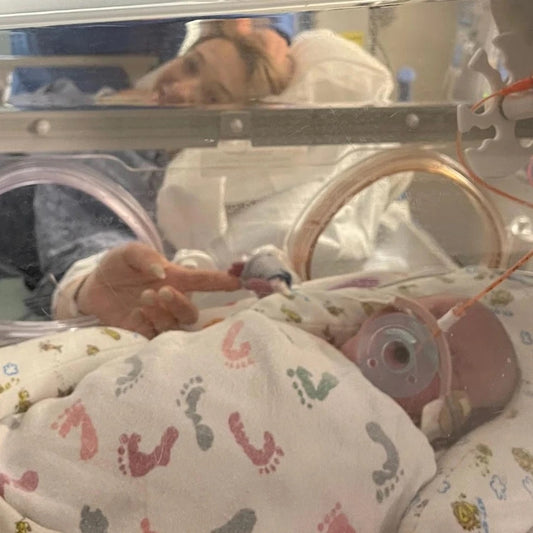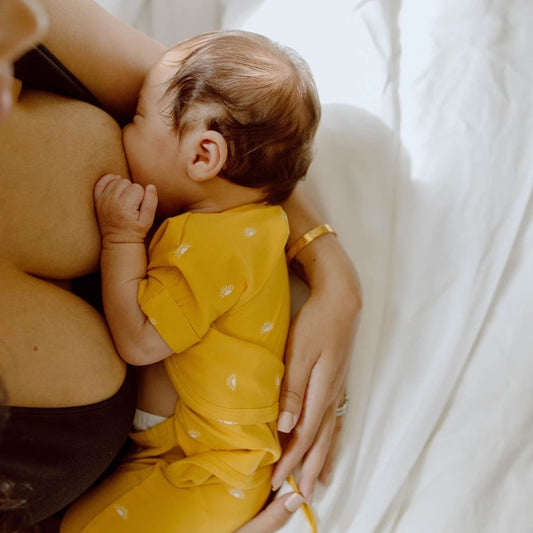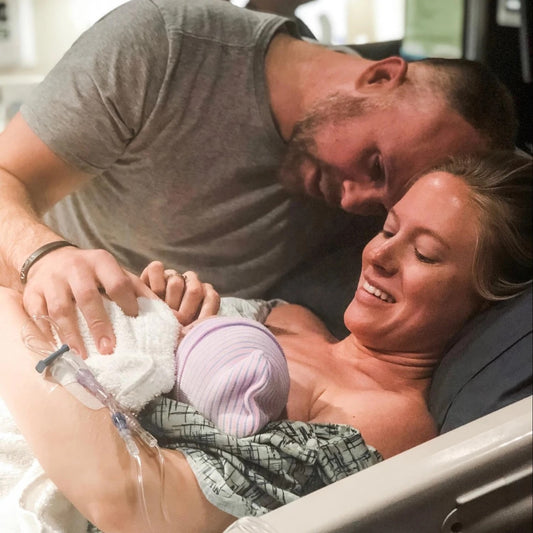Dr. Christina Hibbert, Psy.D., mother and breast cancer warrior.
Rohini More
Dr. Christina Hibbert is a breast cancer WARRIOR
Dr. Christina G. Hibbert, Psy.D, took time from preparing for her 14th breast cancer surgery to work with Bonsie Skin to Skin Babywear to promote breast cancer awareness. We are so inspired by her story and honored to share her words with you.
I was diagnosed with breast cancer right when I felt like I was hitting my stride–as a mother, psychologist, author and speaker–in July of 2019.
I’d gone in for a follow-up mammogram from a lump I’d found 8 months prior that had turned out to be “just a cyst.” I expected the same response for this mammogram, so even when they said I needed an ultrasound, I didn’t worry.
I sat reading the pamphlet about how “most ultrasounds and biopsies are nothing,” and how “rare” it is to actually receive a diagnosis at my age – 44. My mother is a three-time survivor, first diagnosed at 37, and I’d been getting mammograms since I was 27. I was doing everything right – eating a plant-based diet, exercising – so this felt like more of an inconvenience than anything.
It all changed when the doctor and nurses came in, following my ultrasound, with that look of, “Oh, you poor thing.”
One biopsy and two days later, they confirmed what had now become my biggest fear: “I’m sorry. It is breast cancer.”
I’m also a mother of 6. Our story is long and born of tragedy, but in short, we inherited my 2 young nephews when my sister & brother in law died two months apart, just 3 weeks before I was about to give birth to what would have been our fourth baby. I gave birth as our new “sons” moved in, and we went from three to six children practically overnight. (Read about our story in my #1 bestselling memoir, This is How We Grow). That was in 2007. Since then, the boys had been adopted, we’d done our grief and trauma work, and three of the children had already moved out for college.
But that day when I was told, “I’m sorry. It is cancer,” 5 of the 6 happened to be home. In fact, I’d just sent them away with my husband on a weekend family reunion and I'd join them for “later.” Ten minutes after they left, I got the call, my husband turned the car around, and now here we all were in our front room, an eerie silence telling me they knew something big was about to happen.
Telling them, “I have breast cancer” felt like a betrayal. They’d already lost one father and mother, one aunt and uncle who were like a father and mother. How could they lose another?
I reassured them, saying, “Mimi’s (my mother) had it three times, and mine is only stage one. So, you don’t need to worry.”
A few of them weren’t worried and said, “You can do this. I’m not afraid.”
But a few were afraid. How could they not be? As a daughter of a mother with cancer, just 15 when she was first diagnosed, I’d thought, as the oldest, my mother would die and I’d need to miss college to stay home and care for my siblings. I was determined none of them would feel this way. I was also determined to be open and honest about every part of this experience – something I’d felt my mother and father had not done.
“Stage one,” I’d said. “It’ll just be a few months of treatment, and we’ll all go back to normal.” How wrong I was.

Dr. Christina Hibber recovers from breast cancer surgery
Now, three years and four months later, I’m preparing for my 14th breast cancer-related surgery, tomorrow morning.
I’ve endured a double mastectomy, learning my mother and I carry the BRCA1 genetic mutation, chemotherapy and cold-capping to save my hair, a complete hysterectomy to prevent more cancer, blood clots, kidney stones & kidney stone surgery, and ten breast reconstruction-related surgeries, a diagnosis of breast implant illness and starting my reconstruction all over with a DIEP flap reconstruction that led to a life-threatening strangulated hernia one week later, emergency hernia repair surgery, and waking to find I’d had hernia mesh placed in my now-destroyed abdomen. Tomorrow, I’m getting the hernia mesh removed, because it’s made me sick with gastroparesis, infections, and other symptoms these past two years.

Dr. Christina Hibbert’s journey with breast cancer
No. It wasn’t just “a few months.” More like a few years.
My experience is, of course, unique in that way, but not as unique as you’d think. Sure, most don’t have as many complications as I’ve had, but it’s important to know that the type or stage of breast cancer, and even the treatments one must do, don’t predict a certain course or outcome.
Looking back today, as I prepare for yet another surgery, I think of my family–of the impact breast cancer has had on them, on us all.
There’s the mental-emotional impact. Breast cancer is trauma–from diagnosis to treatment planning to chemo, surgery, amputation of your breasts, and the aftermath of it all.
It’s traumatic for the whole family, and some children or family members will experience that trauma more profoundly than others.
Relationships will be impacted and changed...
...And so will you.
I’ve learned in these past three years:
- The mental-emotional toll of breast cancer can feel harder to deal with than the cancer itself.
- The way each child and family member copes is as unique as the way each cancer warrior’s body and mind respond to the treatment they receive.
- Relationships may be damaged through the process, but with time, help, and a willingness to work, those relationships can come out stronger than before.
- Many feel lost through it all, and just want to “get back to normal,” but there is no going back. There is only moving forward–into a new, or a “next” normal, and that takes months, or years even. Patience is key.
- You’re not “done” when they tell you you’re done. The after effects of cancer and treatment can last for years, and in many ways, forever.
- After treatment can feel like the loneliest part. We need our supporters not to disappear just because the chemo or surgery is complete. That’s often when mental health and trauma healing begins, and that’s when we need you more than ever.

Dr. Christina Hibbert and her family
There are so many ways we can better understand, support, and be there for breast cancer warriors, their children, partners, and the whole family.
But the best way? Ask.
“You can’t always tell by looking,” I often teach. You can’t tell how someone is feeling, what their struggles may be, how their health really is. So ask.
Ask, “How do you feel about chemo ending?” Ask, “What is it like for your children going through this? What is it like for you?” Ask, “What do you need from me, specifically?” Ask, “How can I better support you?”
Together, we can raise awareness of the complex journey of breast cancer – for the whole family, and for years to come. Together, we can educate providers on how to better provide for and serve those in need. Together, we can support and be there for those we love through cancer treatment, “after” treatment, and beyond.
Now, I need to go to sleep.
Surgery 14 awaits early in the morning. I’ve talked with and comforted my children, I’ve prepared mentally and physically as much as I could, I’ve spent quality time with my husband, and now? It’s time to show love and compassion to myself. The journey continues…”
Dr. Christina Hibbert is the #1 bestselling author of the award-winning memoir, This Is How We Grow, & of 8 Keys to Mental Health Through Exercise, & Who Am I Without You. Dr. Hibbert is a clinical psychologist, speaker, social media influencer, and thought leader in the areas of maternal and women’s mental health, grief/loss/trauma, self-worth, personal growth, and breast cancer. She is the host of Like a Watered Garden podcast and creator of her award-winning website and blog “DrChristinaHibbert.com.” Christina is also a “Breast Cancer Warrior,” overcoming triple negative breast cancer and the BRCA1 genetic mutation through chemotherapy, cold-capping & 13 surgeries. She was named Most Inspirational Women’s Health Professional 2018 and 2019 plus won Best in Show: Blog 2020 for her work as a patient leader in the WEGO Health Awards. A wife and mother of six, Christina was deeply honored to be named Mother of The Year, AZ 2018.
Links to learn more:
Website: www.DrChristinaHibbert.com
Instagram: http://www.instagram.com/drchristinahibbert
Facebook: http://www.facebook.com/drchibberthttp://www.tiktok.com/drchristinahibbert
Read & Save Code: WARRIOR
Valid for 20% off any purchase until October 31, 2022



